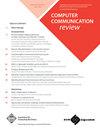Experience-driven research on programmable networks
IF 2.8
4区 计算机科学
Q3 COMPUTER SCIENCE, INFORMATION SYSTEMS
引用次数: 15
Abstract
Many promising networking research ideas in programmable networks never see the light of day. Yet, deploying research prototypes in production networks can help validate research ideas, improve them with faster feedback, uncover new research questions, and also ease the subsequent transition to practice. In this paper, we show how researchers can run and validate their research ideas in their own backyards---on their production campus networks---and we have seen that such a demonstrator can expedite the deployment of a research idea in practice to solve real network operation problems. We present P4Campus, a proof-of-concept that encompasses tools, an infrastructure design, strategies, and best practices---both technical and non-technical---that can help researchers run experiments against their programmable network idea in their own network. We use network tapping devices, packet brokers, and commodity programmable switches to enable running experiments to evaluate research ideas on a production campus network. We present several compelling data-plane applications as use cases that run on our campus and solve production network problems. By sharing our experiences and open-sourcing our P4 apps [28], we hope to encourage similar efforts on other campuses.经验驱动的可编程网络研究
在可编程网络中,许多有前途的网络研究想法从未见过光明。然而,在生产网络中部署研究原型可以帮助验证研究想法,通过更快的反馈改进它们,发现新的研究问题,并简化后续向实践的过渡。在本文中,我们展示了研究人员如何在他们自己的后院——在他们的生产校园网络上运行和验证他们的研究想法——我们已经看到,这样的演示可以加快研究想法在实践中的部署,以解决实际的网络运营问题。我们提出了P4Campus,这是一个概念验证,包括工具,基础设施设计,策略和最佳实践-技术和非技术-可以帮助研究人员在他们自己的网络中针对他们的可编程网络想法进行实验。我们使用网络接入设备,数据包代理和商品可编程交换机来运行实验,以评估生产校园网上的研究想法。我们将介绍几个引人注目的数据平面应用程序,作为在我们的校园中运行并解决生产网络问题的用例。通过分享我们的经验和开源我们的P4应用程序[28],我们希望鼓励其他校园的类似努力。
本文章由计算机程序翻译,如有差异,请以英文原文为准。
求助全文
约1分钟内获得全文
求助全文
来源期刊

ACM Sigcomm Computer Communication Review
工程技术-计算机:信息系统
CiteScore
6.90
自引率
3.60%
发文量
20
审稿时长
4-8 weeks
期刊介绍:
Computer Communication Review (CCR) is an online publication of the ACM Special Interest Group on Data Communication (SIGCOMM) and publishes articles on topics within the SIG''s field of interest. Technical papers accepted to CCR typically report on practical advances or the practical applications of theoretical advances. CCR serves as a forum for interesting and novel ideas at an early stage in their development. The focus is on timely dissemination of new ideas that may help trigger additional investigations. While the innovation and timeliness are the major criteria for its acceptance, technical robustness and readability will also be considered in the review process. We particularly encourage papers with early evaluation or feasibility studies.
 求助内容:
求助内容: 应助结果提醒方式:
应助结果提醒方式:


